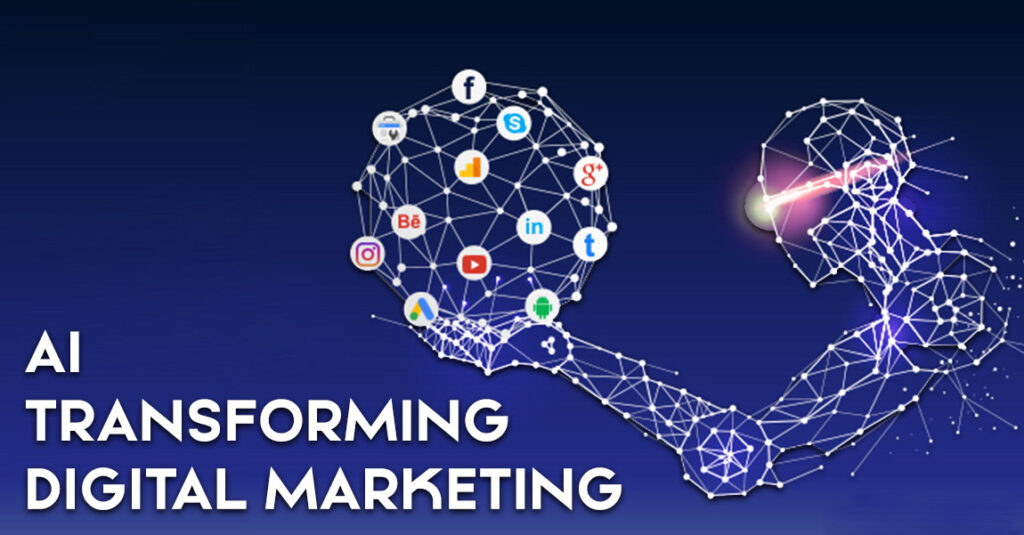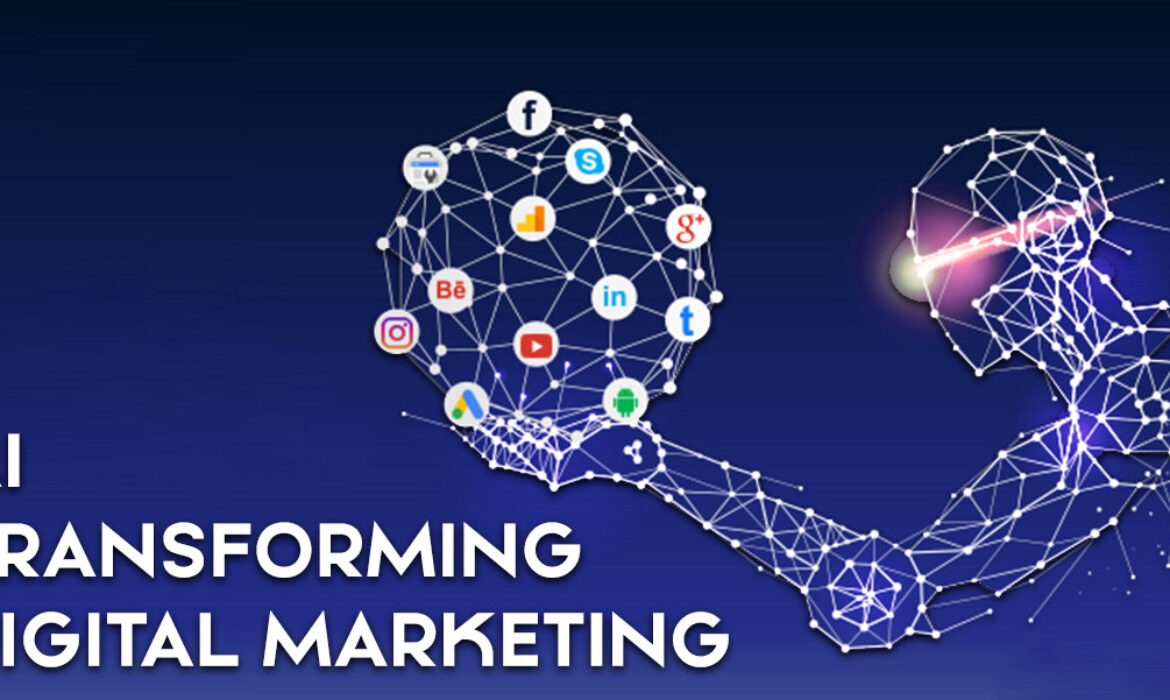Ethical Considerations in AI Marketing:

Balancing Automation and Human Touch
In today’s digital age, the integration of artificial intelligence (AI) in marketing has revolutionized the way businesses connect with their audiences. While AI offers tremendous benefits in terms of efficiency, personalization, and data-driven decision-making, it also raises significant ethical considerations. Balancing automation with the human touch is a crucial aspect of ethical AI marketing. In this blog post, we’ll explore these ethical considerations and strategies for achieving the right balance.
The Rise of AI in Marketing
AI marketing tools have become essential for businesses looking to streamline their operations, enhance customer experiences, and gain a competitive edge. Some common applications of AI in marketing include:
- Personalization: AI analyzes customer data to deliver highly personalized content and product recommendations.
- Chatbots and Virtual Assistants: AI-powered chatbots provide real-time customer support and can handle routine inquiries.
- Predictive Analytics: AI can forecast consumer behavior, helping businesses make informed marketing decisions.
- Content Generation: AI can create and curate content for marketing campaigns, saving time and resources.
While these AI applications offer numerous benefits, they also present ethical dilemmas that marketers must address.
Ethical Considerations in AI Marketing
1. Data Privacy
One of the primary ethical concerns in AI marketing is the responsible use of customer data. Marketers must ensure that the data they collect is obtained legally and used transparently. Additionally, data should be protected against breaches and misuse.
2. Transparency
Marketers should be transparent about the use of AI in their processes. Customers have the right to know when they are interacting with AI-powered systems rather than humans. This ensures that trust is maintained.
3. Bias and Fairness
AI algorithms can inadvertently perpetuate biases present in training data. Marketers must regularly audit their AI systems to identify and rectify any biases that may negatively impact certain demographic groups.
4. Customer Consent
Obtaining informed consent is crucial when collecting and using customer data. Marketers should provide clear explanations of how data will be used and allow customers to opt in or out of data collection and processing.
Balancing Automation and the Human Touch
Achieving the right balance between automation and the human touch is key to ethical AI marketing. Here are strategies to help strike that balance:
1. Human Oversight
Ensure that there is human oversight in critical decision-making processes, especially when it comes to sensitive customer interactions or ethical considerations.
2. Empathy and Authenticity
While AI can provide efficient support, the human touch is irreplaceable when it comes to empathy and authenticity. Encourage genuine human interactions when needed.
3. Regular Auditing
Regularly audit AI algorithms and data sources to detect and rectify biases and ethical issues. Transparency in these efforts can build trust with customers.
4. Customer Feedback
Actively seek and listen to customer feedback about their AI-driven experiences. Use their input to improve the customer journey.
5. Education and Training
Invest in educating your team about ethical AI practices. Ensure that your staff understands the importance of data privacy, transparency, and fairness.
Conclusion
Ethical considerations in AI marketing are paramount in today’s digital landscape. While AI can significantly enhance marketing efforts, marketers must navigate these challenges with integrity and responsibility. By balancing automation with the human touch, maintaining transparency, and staying committed to ethical principles, businesses can build trust with their customers and create marketing strategies that benefit both their bottom line and society as a whole. Ethical AI marketing isn’t just a choice; it’s an ethical imperative that defines the future of responsible marketing.
Optimizing SEO with Artificial Intelligence:

In the ever-evolving world of digital marketing, staying ahead of the curve is essential to drive traffic and engagement to your website. Search Engine Optimization (SEO) plays a pivotal role in this, and with the advent of artificial intelligence (AI), optimizing your SEO strategies has never been more dynamic and effective. In this blog post, we will explore how AI is transforming SEO and provide insights into strategies and tools to help you get the most out of this powerful combination.
Understanding the Role of AI in SEO
Artificial intelligence is revolutionizing SEO by enabling marketers to make data-driven decisions and deliver more relevant content to their audience. AI algorithms can analyze vast amounts of data, identify patterns, and adapt to changes in search engine algorithms, ultimately improving search rankings. Here are some ways AI is changing the SEO landscape:
1. Content Generation and Optimization
AI-powered tools like GPT-3 and its successors can generate high-quality content, including blog posts, product descriptions, and meta tags. These tools use natural language processing to ensure content is relevant, coherent, and optimized for specific keywords.
2. Rank Tracking and Analysis
AI tools provide real-time rank tracking and in-depth analysis of your website’s performance. They can identify which keywords are driving the most traffic, assess your competition, and recommend adjustments to improve your rankings.
3. User Experience Enhancement
AI helps improve user experience by analyzing user behavior and making data-backed recommendations for site improvements. It can suggest changes to the website’s layout, load times, and navigation to keep visitors engaged.
4. Predictive SEO
Artificial intelligence can predict changes in search engine algorithms and trends, allowing marketers to proactively adjust their strategies and stay ahead of the curve.
Strategies for Optimizing SEO with AI
Now, let’s delve into some strategies for optimizing your SEO efforts with AI:
1. Use AI-Powered Content Creation
Integrate AI-generated content to ensure you have a consistent stream of high-quality, SEO-optimized articles and product descriptions.
2. Leverage Chatbots and Virtual Assistants
Implement AI chatbots on your website to enhance user experience, answer queries, and gather valuable customer data.
3. Optimize for Voice Search
As voice search continues to grow, optimize your content for conversational queries and long-tail keywords, which are more likely to be used in voice searches.
4. Harness AI for Keyword Research
AI tools can help identify low-competition, high-conversion keywords that can boost your SEO rankings.
5. Analyze User Behavior
Use AI analytics to gain insights into how users interact with your website. Tailor your content and design based on this data to improve user experience.
Tools for AI-Enhanced SEO
Several AI tools are available to help you optimize your SEO strategy. Some of the popular ones include:
- Google’s RankBrain: Google’s AI algorithm processes search queries to better understand user intent.
- Clearscope: This tool uses AI to identify related keywords and concepts that should be included in your content to improve rankings.
- MarketMuse: It analyzes top-performing content in your niche and suggests improvements to your own content to compete effectively.
- SurferSEO: SurferSEO uses AI to analyze ranking factors and provides data-driven recommendations for on-page SEO improvements.
- ChatGPT: Implement a chatbot powered by AI to enhance user engagement and gather valuable user data.
In conclusion, the integration of AI into SEO strategies is transforming the way businesses approach digital marketing. By leveraging AI-powered tools and implementing the right strategies, you can optimize your website’s SEO, improve user experience, and stay competitive in the ever-changing world of online marketing. Embrace the power of AI in SEO, and watch your website rise in search engine rankings and deliver meaningful results to your bottom line.
How to Increase Your ROI Through scientific SEM?
Want to know the one thing that every successful digital marketer does first to ensure they get the biggest return on their marketing budget? It’s simple: goal-setting. This is an absolutely essential practice for any digital marketer who knows how to execute their campaigns in a productive, cost-effective way. With a few. With a few simple tips, you can be doing the same in no time! In this blog, we’ll walk you through the first steps every savvy digital marketer takes to ensure that they’re on target to hit all their marketing objectives. Get ready for revenue!
Remember: even if the channel you’re considering is all the rage right now, it might not fit your brand. Always make informed decisions that directly relate to your company. Otherwise, your message won’t be delivered to its intended audience and you’ll have wasted time, effort and money.
Know Your Digital Goals
The first step is clearly identifying which goals you want to achieve. Get specific. Do you want to increase brand awareness? Are you all about locking in leads? Do you want to establish a strong network of influencers that can help you be discovered? How about pushing engagement on social media?


Get Specific
A useful tool for narrowing down your goals to ensure they’re viable is the SMART mnemonic. It’s important to get specific to understand exactly what you’re working towards, and help you break down the process of hitting your targets. This is exactly what this mnemonic helps you to achieve.
- Does the channel reach my intended audience?
- Is the channel sustainable and affordable within my company’s marketing budget?
- Will I be able to measure the success of the channel?
- Does the channel allow me to express my brand’s intended message?
- Do the channels I’m considering work together to convey my message?

Always Remember Your Goals!
Establishing a solid vision for your business is the first step to planning your digital marketing budget. Always keep your final goals in sight when organising anything for your company. When deciding which steps to take next in your business, ask yourself how they will help you achieve the goals you outlined in Step #1. This will ensure that you stay on track and prevent you from spending your budget on anything that won’t help you achieve.
Cum et essent similique. Inani propriae menandri sed in. Pericula expetendis has no,
quo populo forensibus contentiones et, nibh error in per.Denis Robinson
As your budget progresses and evolves, continue referring to your SMART objectives. Stay focused and remember your goals – they will always inform what your next step will be!





